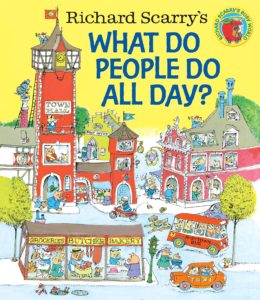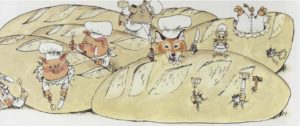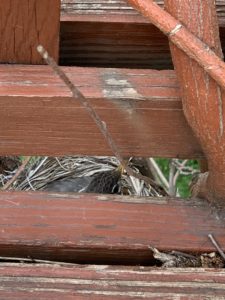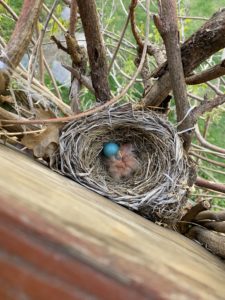
Remember this book? I still have my 1968 edition with Blacksmith Fox, Grocer Cat, Eli Cottontail the Farmer, and their equally hardworking housewife partners. Essential workers, all. No Hedge-Fund Hedgehogs or Insurance Inchworms here. The great pandemic of 2020 has highlighted the importance of the blue-collar and public-sector workers who are not paid anywhere near their true value.
For those of us with the privilege and duty to stay home–either suddenly under-employed, or trying to work and educate our children without the social structures we’d depended on–we’re collectively reckoning with the role of work in our identity. What were we doing that was so important, that it’s worth making heroic efforts to keep it going? When it’s a battle to make our children concentrate on schoolwork, what kind of learning should we prioritize?
Forced into a virtual world of infinite Zoom meetings, many of us have instinctively turned to old-fashioned, hands-on activities: arts and crafts, baking, gardening, needlework. Tending the homestead is how we spiritually nurture ourselves when the apocalypse is at our door. It’s a protection ritual, drawing the life force of the earth into our bodies and imaginations. I’m wary of the gender essentialism in terms like “the divine feminine” but even I can’t help noticing that our current popular pastimes were historically women’s work. Could the ancestors be guiding us to counterbalance the toxic machismo of our government?

Why didn’t I make time for this before quarantine? My regular workload has only increased since the lockdown, so it’s not a matter of scheduling. I felt childish, girlish, sitting down by myself to paint dollhouse furniture during the “workday”. Sitting in front of the computer, on the other hand, counted as “work” whether or not I was using the time productively.
Nathan J. Robinson, editor of the socialist magazine Current Affairs, skewers the American cult of productivity in his essay “Animals Are Pointless, and We Should Be Too”.
A big part of the right’s opposition to the lockdowns, and its desire to open up the economy again as quickly as possible despite the risks, comes from its staunch opposition to “paying people not to work.” (This is one reason they don’t like paid family leave, too.) There is a cult of work: We must produce, produce, produce, and if we are not producing we are bad. The “ethic” part of “Protestant work ethic” is important: Work is supposed to be a positive good rather than a necessary evil.
I do not think this way, because I have been to the aquarium. And I have watched schools of fish just go around in circles for hours and hours. They do not have a point. They do no work. They just exist. Plants are the same. It is not always easy being a plant, but there is a lot of down time. We should take much more of a cue from the flora and fauna that surround us. Once you have the basics, it is enough just to bask in the sunshine and potter around. And if your “contributions” dry up and you do crosswords all day, that’s okay too. You matter. The ducks matter… Life is beautiful in and of itself, and I do not need the old folks to produce scholarly papers in order to care about keeping them alive.
Nature is patient. A mother robin has made her nest right under my second-floor patio. She’s very good at “sheltering in place” on top of her babies. I feel comforted when I walk out the door and see her plump little body resting on the woven twigs.


Poet Sabrina Orah Mark weighs the merits of academic job-hunting and sourdough baking in “Fuck the Bread. The Bread is Over”. It’s the latest installment of her column Happily at The Paris Review, which focuses on fairy tales and modern motherhood.
In fairy tales, form is your function and function is your form. If you don’t spin the straw into gold or inherit the kingdom or devour all the oxen or find the flour or get the professorship, you drop out of the fairy tale, and fall over its edge into an endless, blank forest where there is no other function for you, no alternative career. The future for the sons who don’t inherit the kingdom is vanishment. What happens when your skills are no longer needed for the sake of the fairy tale? A great gust comes and carries you away.
…I send my sons on a scavenger hunt because it’s day fifty-eight of homeschooling, and I’m all out of ideas. I give them a checklist: a rock, soil, a berry, something soft, a red leaf, a brown leaf, something alive, something dead, an example of erosion, something that looks happy, a dead branch on a living tree. They come back with two canvas totes filled with nature. I can’t pinpoint what this lesson is exactly. Something about identification and possession. Something about buying time. As I empty the bags and touch the moss, and the leaves, and the twigs, and the berries, and a robin-blue eggshell, I consider how much we depend on useless, arbitrary tasks to prove ourselves. I consider how much we depend on these tasks so we can say, at the very end, we succeeded.
…Over the years I have applied for hundreds of professorships, and even received some interviews. I’ve wanted a job like this for so long, I barely even know why I want it anymore. I look at my hands. I can’t tell if they’re mine.
“Of course you can tell if your hands are yours,” says my mother. “Don’t be ridiculous.”
“I have no real job,” I say. “Of course you have a real job,” she says. “I have no flour,” I say. “Fuck the bread,” says my mother again. “The bread is over.”
And maybe the bread, as I’ve always understood it, really is over. The new world order is rearranging itself on the planet and settling in. Our touchstone is changing color. Our criteria for earning a life, a living, are mutating like a virus that wants badly to stay alive. I text a friend, “I can’t find bread flour.” She lives in Iowa. “I can see the wheat,” she says, “growing in the field from outside my window.” I watch a video on how to harvest wheat. I can’t believe I have no machete. I can’t believe I spent so many hours begging universities to hire me, I forgot to learn how to separate the chaff from the wheat and gently grind.
I doubt I’ll ever learn how to scythe wheat, but I have been ordering bulk frozen cookie dough from the cafeteria of a local university that’s closed for the spring semester, and I can attest that my home-baked cookies are more popular than my writing. This Grace Paley poem is evergreen.